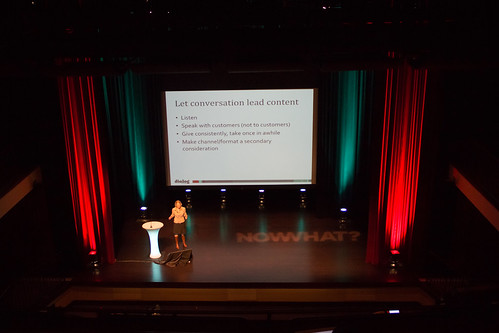
Last week I had the honor of being the first speaker to present at the first Now What Conference. My presentation was called "Marketing Operations: How to get the bang from your bytes." The conference was an amazing experience. Here are a few reasons why.
-
The production values were amazing. Karla Santi and the rest of the Blend Creative Team obsessed over every detail from the stage lighting to the placards showing where to charge your laptop. I have never presented at such a professional conference.
-
The audience was totally locked in to every presentation. It may have been the topics, the format, or the fact that it was a one day conference. Maybe the awful weather scared away the folks who were just looking for a cubicle break. I am not sure how else to explain how engaged the audience was. The lobby outside of the theater was barren during the sessions. Everyone at the conference was in their seats and taking notes.
-
The speakers were excellent. There was a perfect balance of inspirational big ideas and practical advice. The speakers drew from years of experience and came prepared to deliver thoughtful presentations. The conference had one track and I felt like my experience as an audience member was better than I could achieve by making perfect selections at a multi-track conference. Kudos to Deane Barker for the speaker roster.
Many thanks to Deane, Karla, and the rest of the Blend Interactive team for putting on such an excellent conference. The hard work really showed and I hope it was as rewarding for them as it was for us. Hopefully there will be many more.
On May 8th, I will be hosting a panel at CMS Expo called "CMS Review - Compare CMSs For Web Design Studios & Development Firms." The panel is designed to help web design and development shops build their CMS portfolios. Selecting the right platforms to take to market is extremely important because building competency with these technologies takes time and your projects are risky until you do.
In the panel, we will be focusing on the topics most relevant to studios and integrators:
-
The types of sites that the platform is best suited for.
-
Market awareness in industry verticals.
-
Availability and quality of training and support.
This session would also be useful for an internal services group that does web design and development projects for departments within the organization.
I will be around pretty much the whole conference. Look for me if you want to chat about CMS selection, localization, or marketing operations. If you haven't registered yet, use the code Seth2012 for a 10% off discount.
I gave this talk at the J. Boye Conference in Philadelphia last week (GREAT conference by the way. I already verbally committed for next year). My slides are posted on the J. Boye site and you can also get them on SlideShare.
One thing I tried to do with this presentation was to reduce the amount of the bullet points in my slides. While I thought this made the presentation better, the slides are less useful for people who were not there (and also people who were there but missed or forgot the pearls of wisdom I was dropping down). Because of that, I thought it would be a good idea to write a blog post with some of the slides and some key points that I talked about. Here goes...
It is more than just a software project
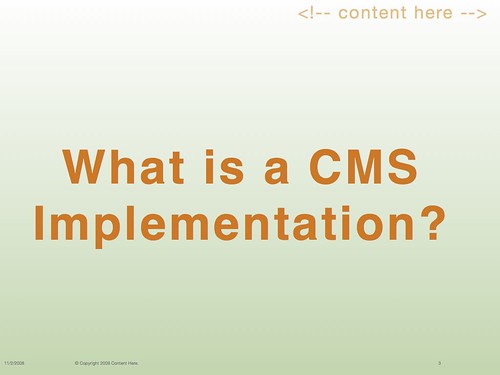
It is extremely rare that an organization just installs and configures a CMS. A CMS project is nearly always in the context of a much larger initiative that might involve:
So it is really a mistake to think of it and evaluate it as just a software project.
It is a roller coaster
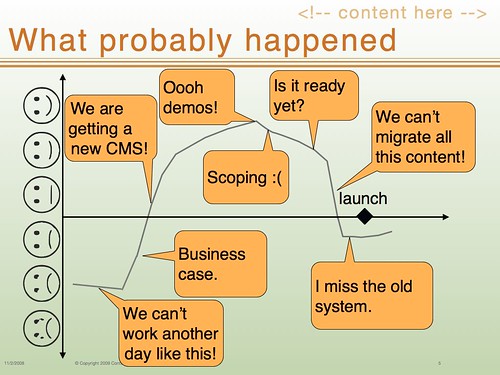
Every project goes through this roller coaster. The business case and software sales process raise expectations by talking about the potential of the solution — long term potential. Launching a new CMS is a tough transition. It doesn't feel anything like the rosy future you were promised.
-
This is a time when you are supporting two sites: you need to keep the wheels on the old site as you migrate content onto the new site.
-
The new tools are unfamiliar to content contributors. They don't know the short cuts and work-arounds.
-
The content you are moving is not as good as you thought so there is unplanned work to improve it.
-
There is organizational pressure to show results for all the money spent.
-
You were probably thinking that you were crossing the finish line but now you realize that the real work is starting and it is going to be a real slog.
There is going to be a dip. It is just a matter of amplitude: how high did you let your expectations get and how much pain did you go through around launch time. A great project may not dip below neutral satisfaction but I have never seen a project easily achieve the loftiest of hopes for it — at least not on day-one.
The components of your grade
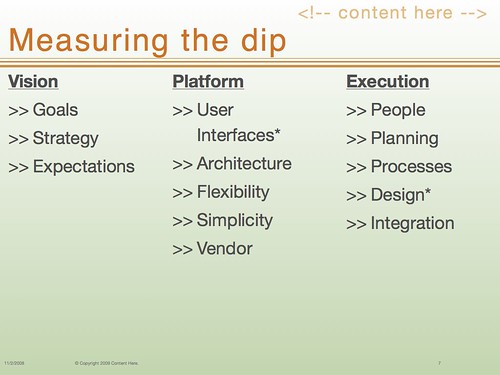
Grading a CMS implementation is matter of measuring the dip and we do this in three dimensions: Vision, Execution, and Platform. Vision is what you are doing and why. Execution is your action against that vision. Platform is the tools that you build on.
How the components fit together
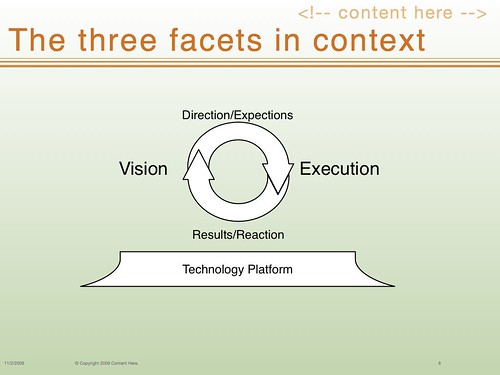
Another way to look at it is you have vision driving execution which then produces results that inform vision. This cycle is supported by a technology platform.
Setting your goals

-
You should have defined, communicated and aligned behind goals.
-
Every stakeholder should be able to give an elevator pitch stating the goals, why they are important, and their role in helping to achieve those goals.
-
Goals should be related with organizational goals.
-
Goals should be measurable. At any point in time you should be able to tell if you are getting closer to your goals or moving away from them
Your content strategy

I didn't go into content strategy too much here because that is a huge topic on its own. I merely introduced what I call the first principles of content strategy. If you have a good handle on audience, information, and behavior, you are probably on the right track to a good content strategy.
Setting expectations
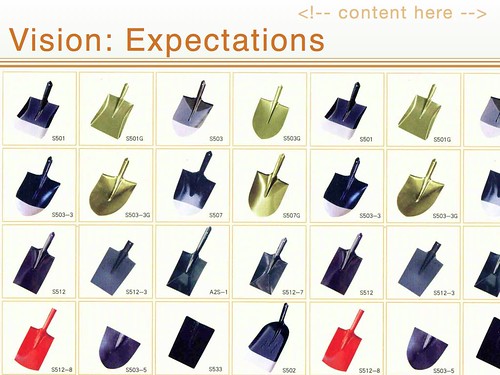
A shovel doesn’t magically produce a hole. A new shovel will be most appreciated by someone who has been desperately scratching at the earth with a stick or his bare hands. Digging is hard work. A shovel makes the effort more productive. Similarly, content production and management is hard work. It's hard to learn and serve your audience. A CMS is like a hand-tool. The right tool will make a dedicated team more effective. If you thought you were getting out of hard work, your expectations were probably unrealistic.
Platform vs. Execution
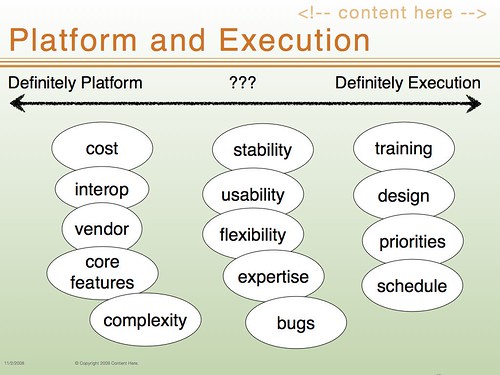
Platform and execution are often difficult to pull apart. The platforms are so configurable that it is not easy to tell if an issue is intrinsic to the platform or if it was self-inflicted by the execution. Different elements tend to gravitate toward one side or the other but there is a big grey area.
Training
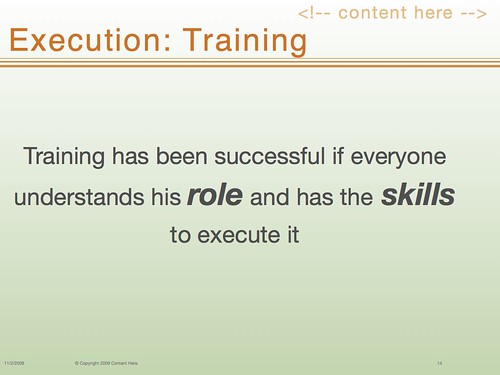
Training is the single most important component of any content management initiative. If your training program is successful, your users will know their roles and have the skills to perform them. They will be able to achieve their goals no matter what obstacles are thrown in front of them. Unfortunately, training is an afterthought in most content management initiatives and is funded by budgetary scraps left over from earlier phases.
You need to think about training 4 stakeholder groups: contributors who add content and participate in workflows; developers who support and enhance the solution; administrators who keep it running; and visitors who consume content. I got a little push back here by people who took the last group literally. I don't mean dragging all the site visitors into a classroom. My point here was that when you make major changes to your website, you need to think about how to help your visitors through the transition. Don't believe me? Remember the Facebook, Digg, and Gawker redesigns and all the agida they produced? Visitor training strategies may include redirects so the old URLs work, search functionality that maps old terms to new terms, and instructional text.
Training programs are most effective when you:
-
Incorporate classroom and practical elements
-
Time classroom training so it happens right before trainees need to do the work — so they don't forget what they learned.
-
Closely monitor and support users as they are starting to work on the new platform. This is when habits are formed (the good ones and the bad ones too).
Content Modeling

Content modeling is important because it determines how content is stored and managed in the system. This has implications in how content is authored and, more importantly, what you can do with the content. More structure means better reusability but it also makes the content contributor more dependent on the template developer to control what the visitor sees. You need a balance. In order to achieve that balance, your content contributors need to buy into the notion of separating content from layout and you also need to give them formatting tools where they need them.
This is an example of unstructured content. The editor used styling to give the impression of structure. The CMS would have a hard time doing things like creating a summary of this content on an index page or optimizing this page for a mobile device.
After beating this example up, I will defend it by saying that in this case a wiki was the right tool because the organization didn't have access to presentation template developers, had plenty of content editors, didn't have a lot of content, and needed to be nimble. A wiki is not a bad platform for Wikipedia either. So the amount of structure really depends.
Worlkflow
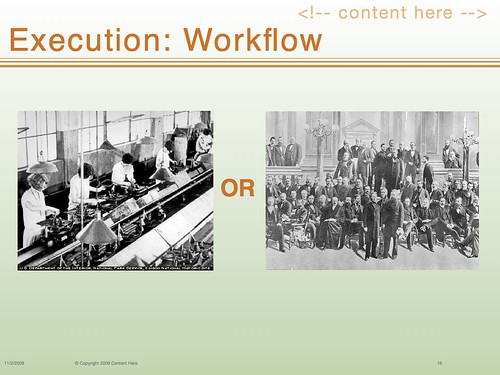
Here I gave my Manufacturing/Legislation metaphors of workflow. If you want to increase efficiency with workflow you need to have specialists at the ready to help produce content. Workflows dominated by approval steps publishing down. Don't aspire to the assembly line but create Congress.
Presentation
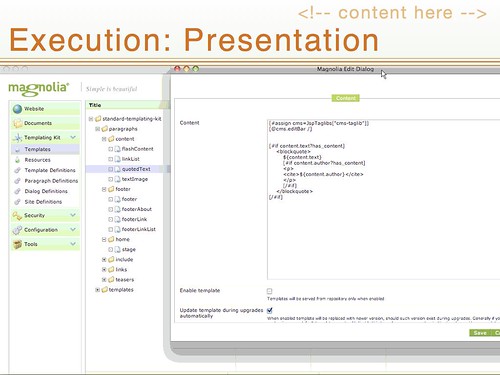
Most of the technical effort of a CMS implementation is usually in developing presentation templates. This is where all of your display logic is. Any visitor-facing behavior is also coded in presentation templates. There are two ways to fail here. Inefficient code that does not use caching effectively or has sub-optimal content queries will cause your site to become unstable when under load. Sloppy, repetitive coding will be a long term maintenance nightmare.
Instrumentation
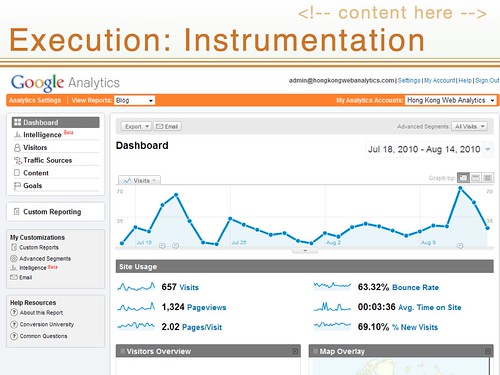
Instrumentation is more than just tracking hits and unique visitors. Those metrics can be useful for signaling major issues and trends but you really need to be tracking data that will tell whether your strategy is working or not. This gets back to my point that content strategy is based on Audience, Information, and Behaviors. Instrument your site to tell you whether or not your information is driving the right behaviors from your audience. Collecting the right data will help you refine your vision and strategy so you can iterate toward long term potential that your business case promised.
At the end of the session, I handed out this Content Management Assessment worksheet. I encourage you all to think about a CMS implementation you were involved with and grade it. How did you do? If that was fun, please take my survey!
CMS Implementation Worksheet
A few weeks ago I had the pleasure of participating in a J.Boye expert group in New York. I love the open and honest format of the J.Boye events and am looking forward to the J.Boye conference this May (3-5). I am presenting on content management assessment (Grading Your CMS Implentation) in the web content management track. That track will also have a talk on HTML5 and case studies from The Nature Conservancy, The Smithsonian Institution, and University of Houston Libraries.
I think this is going to be a great track for organizations that have laid down the first parts of the foundation and are looking to take their websites to the next level. Hopefully I will see you there.
After taking a break from conferences in 2010, I am planning on doing more speaking in 2011. I am starting off my 2011 conference campaign with one of my favorite conferences: J. Boye in Philadelphia. As I have mentioned before, the J. Boye conferences are excellent. The sessions are informative and practitioner-oriented, but what really makes the conferences great is the social element. More than any other conference that I know of, the J. Boye team plans and promotes social activities that encourage attendees to get to know each other and exchange ideas.
I will be presenting a session called Grading your CMS implementation. There is greater potential to understand requirements in the months after a CMS rollout than leading up to and during the implementation. The only form of failure is not using that information to make corrections. However, most organizations label the selection/implementation project as either a qualified success or a total failure and suffer until the next CMS procurement (when they will repeat the cycle). They don't treat it as a milestone in a larger content initiative, which they should. My presentation will show how to create feedback loop to correct issues in three areas: expectation rationality, platform suitability, and project execution. Organizations preparing for a CMS initiative will learn how to set their project up for success and avoid common pitfalls.
Hopefully, I will see you at J. Boye in Philadelphia this May (3rd-5th). If you don't catch my session, I am sure I will see you at one of the social events.
The conference schedule for J. Boye Philadelphia 2009 (May 5th-7th) is taking shape nicely. The J. Boye team has added several case studies to make it a true "user conference" just like the J. Boye conferences in Denmark that I have raved about in the past. Expert speakers include David Pogue, Lou Rosenfeld, Lisa Welchman, Martin White, and Tony Byrne. J. Boye takes great care to keep the tone of the conference un-salesy and encourage a candid exchange of information. To keep the conversation going after the sessions end each day, there are also three social events: the Conference Dinner (May 5th), the Conference Party (May 6th) and the Farewell Dinner (May 7th). If you are coming in from overseas you also might want to attend the "Jetlag Reception" on Monday May 4th.
Although the early bird special is no longer available, you can use the coupon code "sgphilly" to get 15% off the list price. If you work for a non-profit, you can probably get a better discount by contacting the J. Boye team directly. I hope to see you there!
I just heard that Artemis Software is distributing an out-of-the-box integration of Microsoft Content Management Server called MCMS.RAPID that is to be installed on top of MCMS 2002. The interesting thing is that, MCMS.RAPID is an open source project. Read the license here. I was not able to find an announcement on Microsoft's website.
The email announcement that I received made it seem like this was an Open Source CMS. But in reality it is just a set of customizations that provide a higher starting point for an MCMS development project. You still need to purchase the full MCMS product from Microsoft. I have heard criticism of MCMS for being very expensive to license. This set of extensions might reduce the total cost of ownership and make MCMS a more attractive option. Still, as I noted in another post, Microsoft does not seem to be paying much attention to this product so I would carefully consider purchasing it.













